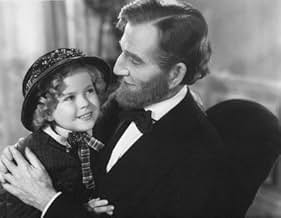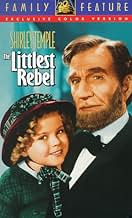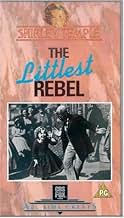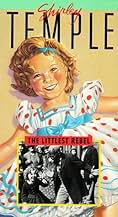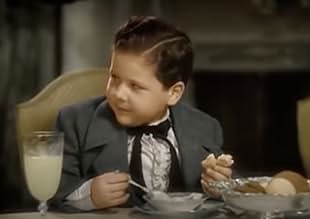Shirley Temple's father, a rebel officer, sneaks back to his rundown plantation to see his family and is arrested. A Yankee takes pity and sets up an escape. Everyone is captured and the off... Read allShirley Temple's father, a rebel officer, sneaks back to his rundown plantation to see his family and is arrested. A Yankee takes pity and sets up an escape. Everyone is captured and the officers are to be executed. Shirley and "Bojangles" Robinson beg President Lincoln to interc... Read allShirley Temple's father, a rebel officer, sneaks back to his rundown plantation to see his family and is arrested. A Yankee takes pity and sets up an escape. Everyone is captured and the officers are to be executed. Shirley and "Bojangles" Robinson beg President Lincoln to intercede.
- Director
- Writers
- Stars
- Awards
- 4 wins total
- Sgt. Dudley
- (as Guinn Williams)
- Director
- Writers
- All cast & crew
- Production, box office & more at IMDbPro
Featured reviews
Yes, Willie Best's character is an embarrassment when it is not infuriating. There's no arguing that.
But Bill Robinson's character is very different. He is the one on whom Mrs. Cary relies when her husband is at war, he is the one who makes it possible for Cary to get back to see his wife as she is dying, etc. He is also the one who makes it possible for he and little Virgie to get to Washington and, eventually, plead her father's case with President Lincoln. In short, he is the character who makes pretty much everything good happen.
Yes, there is injustice in that he should have received higher billing as a result, and he should have been in the final shot with Temple, as he was as important as her father and more important than Jack Holt. That was unfair, and though probably based on what Fox thought American audiences of the time would tolerate, nonetheless a concession to the racism of the time. But for its time, this movie is remarkably devoid of the "dumb and happy darkie" stereotypes of the time that are so infuriating.
Furthermore, little Virgie never once treats "Uncle Bill" as anything less than an equal. Nor do her parents ever treat him disparagingly.
Race relations in this movie are not perfect. But neither are they stereotypes. There is no point on zooming in on Willie Best's character and going through all the modern clichés of moral superiority, only to dismiss it. The movie deserves better than that.
Yes, the dancing by Robinson and Temple is a wonder. But this movie has other things that are worth examination as well.
Forget what you may have been told about this movie and try to watch it with an open mind. You won't waste your time.
As a professional musician I am astonished at her near perfect execution of complex syncopated dance routines with Bill Robinson. It is evident that she is really having fun during these numbers and surely was an attentive student. When she sings, her voice, although not a trained voice (thank goodness) is right on pitch. It is a natural, pleasant voice, free of any coaching. She really sings the lyric, (something that most "pro" singers could stand a lesson in) and not just the song. I never really stopped to listen to "Believe me if all these endearing young charms" but her non-treatment forced me to hear it. It's a very touching song.
How I would enjoy a chat with her to pick her brain. She really was a "perfect storm" as child stars go and I will certainly be screening more of her films....for my...AHEM...daughter, of course.
The second is a chance to talk to your children about the way black characters and white characters interact in this film. Some younger children may be confused by the divide between the black characters and the white characters (especially those who attend racially-diverse schools,) but this is a good time to explain to them the racist attitudes of the time period, and ask them how it makes them feel.
The best way to combat racism is not to sweep it under the rug, but to teach children where we were, how far we've come, and how far we still need to go. Give children the credit they deserve, they will understand.
This film is a perfect opportunity to relate to your children and instill guidance.
The black people are not only less intelligent than the whites (notice the girl so dumb she can't even remember a single line her mother told her to memorise to impress the young white child star - or perhaps she's just so nervous in the presence of the superior species that she can't remember), but they're completely happy being enslaved.
They absolutely love being told what to do by the six year old landowner's daughter, and the neighbourhood slaves just wait around for young Shirley to lavish some attention on them.
The thing I most regret about the film was that they forced the blacks to dance and entertain their white hosts like a bunch of chained elephants or circus freaks.
Its always a bad sign when the civil war is portrayed as a distruption to the desired state of affairs, as it is here and in Gone with the Wind.
1/5
Only youngsters, who don't yet understand that the only difference between white folks and black folks is skin pigment, which only evolved from a group of people living in an ultra-sunny climate for years, will be able to enjoy this film. But perhaps its better for society if you don't show it to them - the young are so impressionable, after all.
UPDATE: Can I point out that I've noticed people don't like this review, and I'm not surprised; its intentions were so innocent, it feels a shame to accuse it of causing offense, but unfortunately, I'd still suggest this one not be shown to impressionable kids for the reasons I have outlined above.
Did you know
- TriviaBoth John Boles and Bill Robinson nearly drowned while trying to cross a raging, 15-foot river for an escape scene that was cut from the film.
- GoofsWhen the Union soldiers are caught looting, the commanding officer orders them to be flogged. The US Army according to the "History of the United States Army" stopped flogging at the beginning of the Civil War in 1861--this scene is obviously later in the war as Union forces are occupying the south.
- Quotes
Virginia 'Virgie' Cary: [singing] Oh, I eat watermelon and I have for years. Sing Polly-Wolly-Doodle all the day! I like watermelon but it wets my ears. Sing Polly-Wolly-Doodle all the day!
- Alternate versionsAlso available in a computer colorized version.
- ConnectionsFeatured in Of Black America: Black History: Lost, Stolen or Strayed (1968)
- SoundtracksPolly Wolly Doodle
(1880) (uncredited)
Traditional
Modified Music by Sidney Clare (1935)
Modified Lyrics by Buddy G. DeSylva (1935)
Sung by Shirley Temple with Bill Robinson
Reprised at the end by Shirley Temple
- How long is The Littlest Rebel?Powered by Alexa
Details
- Runtime1 hour 13 minutes
- Color
- Aspect ratio
- 1.37 : 1
Contribute to this page



